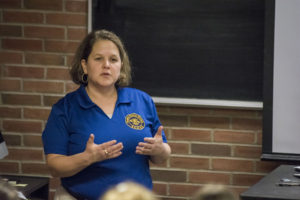
“CSI is crap.”
Kristin Schelling, assistant technical leader for the Michigan State Police forensics lab, shared her own experiences in forensics and explained the top 10 differences between television shows like CSI and real life in a forensics lab. She spoke on behalf of the biology department at 7 p.m. Thursday night to a standing-room-only crowd of students and faculty in Strosacker Science Center.
“I’ve seen parts of the shows. I don’t watch them myself, but I will show clips as teaching tools to demonstrate what is wrong about a particular scene,” Schelling said.
Schelling, while based in Lansing, is responsible for the technical equipment in all eight of Michigan’s forensics labs. She has trained up to 29 people at one time and has a dry sense of humor. One time, at a garage sale she hosted, she marked off areas with caution tape used at crime scenes.
After entering Grand Valley State University with a desire to pursue biology education, Schelling discovered through student teaching that that was not the job for her. Instead, she attended Central Michigan University to obtain her master’s degree in biology.
Schelling’s first job was in quality control for a cheese factory.
“Working in that [cheese] lab actually helped me get my forensics job,” Schelling said.
From there, she worked in Albany, New York, during a time when her department was responsible for identifying victims of the World Trade Center terrorist attacks in 2001.
Schelling advised students on the requirements for entering her field and explained the difference between casework, like you see on CSI, and CODIS, a database for storing and matching criminal records and information. Schelling detailed the different careers within the Michigan State Police forensics department.
There are jobs and internships in toxicology, drug chemistry, latent fingerprints, questioned documents, firearms, and crime scene. The field she described as closest to what is seen on crime shows is the trace evidence department. This field requires analysis of tire marks, paint chips, footprints, and glass fragments at a crime scene.
However, Schelling was quick to point out, with humorous visuals on a powerpoint presentation, the discrepancies between Hollywood and reality.
The 280 scientists throughout Michigan wear goofy lab coats and masks, not tight-fitting dresses and stilettos.
“I do get to drive a state car, but not a blue one,” Schelling said about the equipment her lab uses. “No helicopters or hummers.”
She pointed out that when a DNA sample is entered into the database, their picture, name, address, and phone number do not immediately appear. The processes take longer than a half-hour television show, usually whole handprints aren’t left over to be examined, and the MSP does not respond to every crime scene.
“I have never arrested or interrogated everyone,” she said, pointing out that many divisions are comprised mostly of civilians.
Despite differences between real-life labs and TV, Professor of Biology Dan York said when he visited the Lansing lab this past summer, he felt like a star on a set. Like the labs on CSI, much of the DNA testing is conducted in the dark, illuminating scientists’ faces with fluorescent lighting.
“When I walked through [the Michigan lab] though, it reminded me a lot of a CSI lab. It was absolutely amazing,” he said.
For some, the talk opened up possibilities of research they hadn’t considered before. Others found the talk enlightening, but the prospect of working in forensics unappealing.
“I’m interested in staying in the Michigan area and pursuing research. I really enjoyed the more science-related information she gave on DNA testing,” senior biology major Hannah Russell said. “Personally, I don’t think I could deal with that much crime. I don’t think my personality would be good for that.”
